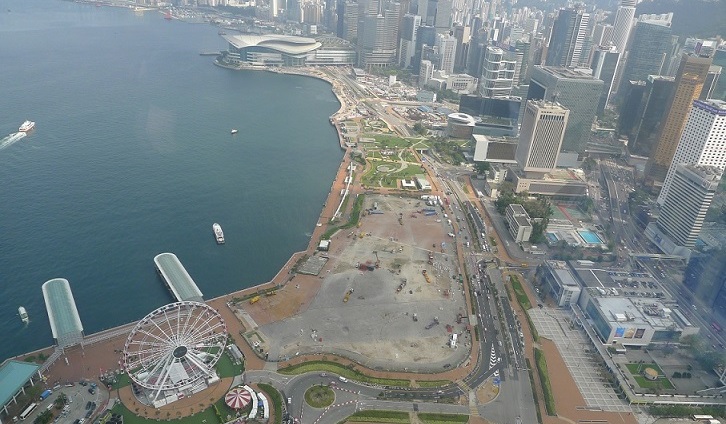Reviews & Articles
原則處處 | Principles everywhere
John BATTEN
at 4:00pm on 21st March 2019

圖片說明Caption:
中環填海區的鳥瞰圖 ,還有人民解放軍碇泊處的近景特寫(圖片由作者提供)
Bird’s-eye view of Central Reclamation and close-up of mooring place for People’s Liberation Army (Photographs: John Batten)
(Please scroll down for English version)
巴塞爾藝術香港展會(Art Basel)揭幕在即,展前活動也陸續展開,我最近便出席了其中一場新聞界午餐會,由藝術展的主要贊助商UBS瑞銀銀行,在其中環國際金融中心52樓辦公室舉行。任何希望宣傳活動的機構,都常以記者午餐會為公關手法 。我不常出席這類活動,因為我希望盡量保持作為藝評人的專業獨立性。或者更準確地說,我相信只要婉拒此類邀請,便可以保持自己的獨立性。兩者之間有種微妙的不同!
老實說,獨立性和堅守一己原則,是我們必須努力的理想。隨著時間過去,我們總會在不知不覺中建立各種關係。我們建立友誼 。每段關係都會高度重視忠誠。我們都有偏見。我們可以被說服。原則可以妥協。然後,我們可以簡單地說句「我改變主意了」來作為辯解理由。
由感受強烈的原則立場走向不再強硬的取向的情況,可以隨著時間慢慢加劇。在所有人與人的交往之中,我們都面對著既要保持標準又要被其他人明白的個人內心鬥爭,特別是差錯出現之後,無論那個錯誤有多不重要。這種情況可以由一首歌曲概述。這首作品由Nina Simone原唱,後來因為The Animals樂團以藍調搖滾版本演續而熱賣。樂隊主唱Eric Burdon娓娓唱出:
「……有時候我發現自己獨自後悔/一些小小的傻事/一些我做過的簡單事情/
因為我只是心懷好意的靈魂/上主,請別讓我被誤解……」*
午餐會上,大會向傳媒公佈了UBS瑞銀將於巴塞爾爾術香港展會展廳展出的藝術作品。今年,瑞銀在收藏中選出了具影響力美國藝術家Ed Ruscha的作品。他的早期作品包括南加州市區景貌的照片,通常都是世俗的建築物和關於一系列相同主題,再輯錄成書,配上平凡的書名,例如:《Twentysix Gasoline Stations》(26個油站) (1963) 和《Every Building on the Sunset Strip》(日落大道上每座建築物) (1966)。他的畫作和圖像作品則帶有諷刺味,上面以單字和短句為主題,通常取材於並令人想起商業廣告、荷里活和洛衫磯。我很想看到這位作家的作品填滿一整個房間、一整個畫廊或一整個展廳。
展覽期間,銀行展廳是限制進出的。單憑一張普通的貴賓卡不足以讓你進內參觀。展廳的尊貴獨特性,正是一些參觀者認為吸引之處。擁有展廳的進出權,給人感覺的尊貴程度又再高一些。然而,這個做法卻與我的平等主義根源背道而馳。如果展廳內的藝術品是如此難以接觸,這些藏於尊貴展廳大門背後的偉大藝術作品,又為什麼值得傳媒撰文報導? 這些作品就不能更公開地展出嗎?我向銀行的公關大員提出了這些問題。我承認我沒有窮追猛打,而且也吃了一頓精彩午餐。
UBS 瑞銀的藝術藏品屬於私人擁有,在該行遍佈全球的辦公室中展示。銀行並沒有任何義務向公眾展出。當然,藏品中不少作品,也有臨時借出予世界各地的博物館和藝術機構讓公眾欣賞。同樣地,香港的廣大市民也會希望看到Ed Ruscha的作品。可以安排一下嗎?
離開傳媒午餐會時,我瞥見了地面上的中環填海區。居高臨下地看過去,這片土地空無一物,大部份空間撥作公路用途的做法便格外清晰。另外可以看到的,是一塊優質海傍土地,成為了人民解放軍專用的碇泊位,供海軍船隻間中停泊用。文化保育人士和城市規劃師已多番提出合理的反對,以及更佳地善用中環填海區的其他構思,包括保留郵政總局,但卻似乎被置若罔聞……
這裡帶出的問題是:這種做法所展現的,到底是哪種官僚社會責任原則?
* 《Don''t let me be misunderstood》,1963年由Nina Simone原唱。
原文刊於《明報周刊》,2019年3月16日
Principles everywhere
by John Batten
One of the pre-Art Basel art fair functions I recently attended was a lunch hosted for the press by the art fair’s principle sponsor, the Swiss bank UBS, at their 52nd floor office at IFC in Central. Press lunches are a common public relations exercise for any organization wishing to promote their activities. I don’t often attend these sort of events – I try to preserve my professional (in this case, art critic) independence. Or, more accurately, by declining such invitations I believe within myself that I am maintaining my independence. That is a subtle difference!
Honesty, independence and sticking to one’s principles are ideals that must be worked at. We all, over time, make subtle alliances. We form friendships. Loyalty is valued highly in any relationship. We have biases. We can be persuaded. A principle can become compromised. And then we can justify ourselves and any action by simply saying, “I changed my mind.”
Moving from a strongly-felt principled stance to a less-rigid position can be subtle and incremental over time. In all human interactions there is the personal battle to maintain standards and be understood by others, especially after even an inconsequential slip-up. This was summed-up in the song originally sung by Nina Simone and made famous by The Animals with their best-selling blues-rock version, with lead singer Eric Burdon belting-out:
“…Sometimes I find myself alone regretting / Some little foolish thing /
Some simple thing that I''ve done / ‘Cause I''m just a soul whose intentions are good /
Oh Lord, please don''t let me be misunderstood….” *
The lunch was held to announce to the press the art that UBS would exhibit in their lounge at Art Basel. This year, artwork from the bank’s collection by influential American artist Ed Ruscha will feature. His early work included photographs of the Southern Californian urban landscape, often of mundane buildings and of subjects in series, published as books with prosaic titles, such as: Twentysix Gasoline Stations (1963) and Every Building on the Sunset Strip (1966). His, often satirical, paintings and graphic work of single words and phrases referenced and was inspired by commercial advertising, Hollywood and Los Angeles. He is an artist whose work I would like to see fill a room, a gallery, or, a lounge.
Access to the bank’s lounge during the fair is restricted. You need more than a common VIP card to get inside. And, it is the lounge’s ultra-exclusivity that is such an attraction for some art fair goers. There is a notch-up in perceived prestige by having access to enter. This, however, goes against my egalitarian roots. If the art in the lounge is so difficult to access, this great art kept behind the doors of an exclusive lounge, then what’s the point of the press writing about it? And, couldn’t the art be shown more publicly? I posed these queries to the bank’s public relations staff. I admit I didn’t press the point, and I did eat the excellent lunch.
The UBS art collection is a private collection – displayed in the bank’s offices around the world. It doesn’t have any obligation to exhibit it to the general public. Of course, pieces from the collection are temporarily lent to museums and art institutions and seen by the public in different countries. Likewise, the wider Hong Kong public would love to see Ed Ruscha’s work. Could this be arranged?
As I left the press lunch, I glimpsed the Central Reclamation far below. From this height, the land’s barrenness and large spaces devoted to roadways is emphasized. Also seen is a strip of prime harbor-front land designated for the exclusive use of the People’s Liberation Army to moor an occasional naval boat. Rational objections and better alternative ideas for the Central Reclamation, including retaining the General Post Office, have repeatedly been made by heritage activists and urban planners, seemingly on deaf ears….
It begs the question, what principles of social responsibility by officialdom is on display here?
* Don''t let me be misunderstood, originally sung by Nina Simone, 1963.
This article was originally published in Ming Pao Weekly, 16 March 2019. Translated by Aulina Chan.
